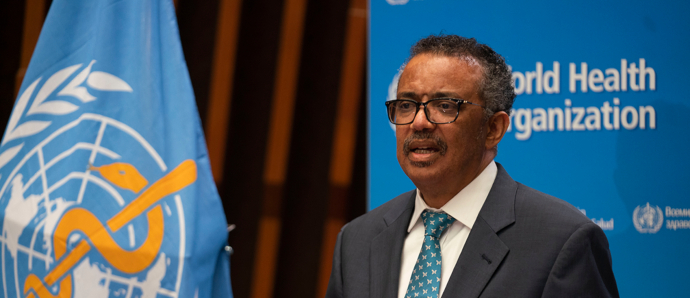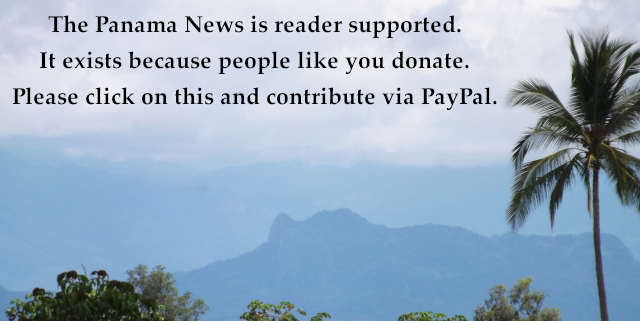World Health Organization Director-General Dr. Tedros Adhanom Ghebreyesus. WHO archive photo.
Keynote speech at the Berlin World Health Summit
by Tedros Adhanom Ghebreyesus
Your Excellency Chancellor Olaf Scholz,
Excellencies, dear colleagues and friends,
Guten Abend, it’s an honor to be here.
Vielen Dank to you, Chancellor Scholz, and the government and people of Germany for your hospitality.
My thanks also to you for your patronage of the World Health Summit, together with me and our fellow patrons President Emmanuel Macron and President Macky Sall.
I would also like to thank Professor Axel Pries, and your colleagues, for your partnership as co-hosts of the World Health Summit for the first time.
About 14 years ago, I received a call asking me if I was interested in joining a committee to start a new health conference in Germany.
Thank you Dr Detlev Ganten, the past President, for that surprise many years ago, and for your leadership.
The first World Health Summit was held in 2009, which as you remember, was the same year that the world last experienced a pandemic, of H1N1 influenza.
We are at a similarly decisive moment now, as the world emerges from the most severe health crisis in a century.
The theme of this year’s World Health Summit is “taking global health to a new level”.
It sounds great. But what does it mean?
Let me suggest three things.
First, taking global health to a new level means we need a new global agreement, or global accord, based on a shared vision.
At exactly the moment when the world needed to come together to face this common threat as one, the COVID-19 pandemic has been characterized by a lack of cooperation and coordination.
We can only face shared threats with a shared response, based on a shared commitment to solidarity and equity.
That is what the pandemic accord that countries are now negotiating is all about: an agreement between the nations of the world to work together – not in competition with each other – to prepare for and respond to epidemics and pandemics.
In 1968, at the height of the Cold War, countries across the ideological divide came together to sign the nuclear non-proliferation treaty.
Today, it remains as relevant as ever.
In the same way, the global accord now being negotiated will underpin the global approach to epidemics and pandemics for decades and maybe even centuries to come. That’s why we call it a generational agreement.
I need to be very clear: this accord is being negotiated by countries, for countries, and will be adopted and implemented by countries, in accordance with their own national laws.
The claim by some that this accord is an infringement of national sovereignty is quite simply wrong.
It will not give WHO any powers to do anything without the express permission of sovereign nation states.
If nations can negotiate treaties against threats of our own making, like nuclear, chemical and biological weapons, tobacco, and climate change, then surely it makes sense for countries to agree on a common approach to a common threat that we did not fully create and cannot fully control – a threat that comes from our relationship with nature itself.
Such an agreement will provide an essential framework and foundation for other initiatives to keep the world safe.
Which leads me to my second suggestion.
Taking global health to a new level requires a new global architecture that is coherent and inclusive.
Just as the pandemic exposed political vulnerabilities, it also exposed technical and operational vulnerabilities in the world’s collective ability to prevent, detect, and respond to outbreaks and epidemics.
It’s clear we need new and better tools to build a new and better architecture.
Several parts of that architecture are already being constructed:
Stronger financing through the newly-established Financial Intermediary Fund, as His Excellency the Chancellor indicated – and thank you for your generosity;
Stronger global surveillance through the WHO Hub for Pandemic and Epidemic Intelligence, which opened here in Berlin last year;
Stronger accountability through the Universal Health and Preparedness Review, which is now being piloted in four countries;
And a stronger WHO, thanks to the historic commitment by Member States at this year’s World Health Assembly to make our financing substantially more predictable, flexible and sustainable.
A new agreement and a new architecture are essential. But we also need fundamental changes to the conditions that shape the health of the world’s people.
Which brings me to my third suggestion:
Taking global health to the next level means a new global approach that prioritises promoting health and preventing disease, rather than only treating the sick.
By and large, the world’s health systems do not deliver health care. They deliver sick care.
Many countries spend huge sums treating diseases that could be prevented for a fraction of the cost.
That’s why I am calling on all countries to make a paradigm shift towards promoting health and preventing disease, recognizing that health starts not in hospitals and clinics, but in homes, streets, schools, workplaces.
Making this shift requires a reorientation and rebalancing of health systems towards primary health care, as the foundation of universal health coverage and health security.
It also requires changes in how governments approach health, and fund it.
Health can no longer be just the business of the health ministry or the health sector, but of the whole of government, and the whole of society.
Health must be a primary consideration in urban planning, tax policy, transport, education policy, commerce, trade, finance, infrastructure and so on.
That means health can no longer be a junior portfolio in government, as it is in many countries, but must be elevated, because healthy and secure populations are the foundation for healthy and secure societies and economies.
Chancellor Scholz, Excellencies, dear colleagues and friends,
We live at a time when around the world, global peace is under threat, and must be protected and promoted with strong and principled leadership.
Equally, we live at a time when global health is under threat, and must be defended with equally strong and principled leadership.
Over the next 48 hours, we have the opportunity to forge the path ahead together.
Importantly this week, we also have the opportunity to commit the resources to finish the job of consigning polio to the history books.
Thank you Chancellor for announcing the funding from Germany. Vielen dank.
We have come so far. We’re so close. Now is the moment for all of us to work with determination, cooperation and innovation to give future generations the gift of a polio-free world.
So what does it mean to take global health to the next level?
A new global agreement;
A new global architecture;
And a new global approach.
Because health is not a cost, it’s an investment;
It’s not simply an outcome of development, but the means;
It’s not a luxury, but a fundamental human right.
As I often like to say, Gesundheit ist ein Menschenrecht!
Vielen Dank. I thank you.
Contact us by email at fund4thepanamanews@gmail.com
To fend off hackers, organized trolls and other online vandalism, our website comments feature is switched off. Instead, come to our Facebook page to join in the discussion.
These links are interactive — click on the boxes












